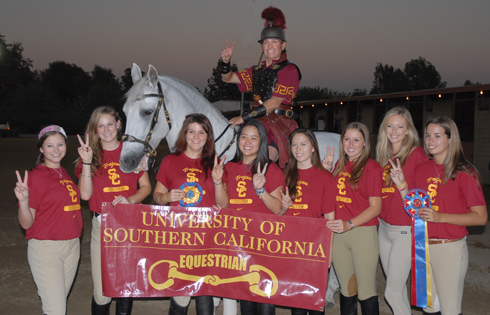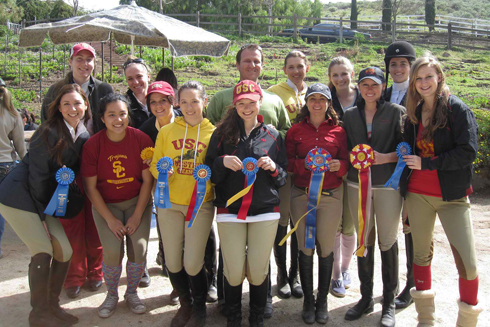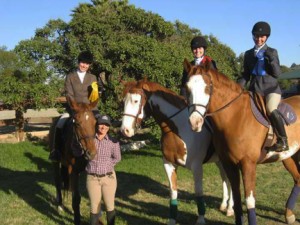Heartbreak for USC
By Paula Parisi April 22, 2011The University of Southern California’s equestrian team ended its best season by missing the IHSA National Finals by two points. USC made it to the regional Zone 8 Finals, April 2–3 at the Fairplex in Pomona. There they missed by a heartbreakingly slim margin the chance to compete at the Intercollegiate Horse Show Assn. Finals, May 5–8 at the Kentucky Horse Park in Lexington, KY.
Only the two top-placed teams advance to the IHSA Finals. Stanford placed first for the second year in a row, and the University of Boulder came in second, with USC trailing in third. Though thrilled with her team’s performance throughout the year, USC equestrian team coach Karen Perlow was clearly disappointed at falling short at the finish.
“As a coach, I’m very competitive, because it’s my career,” said Perlow, who also manages her own Grandview Farms hunter/jumper operation out of The Paddock Riding Club in Los Angeles, where the USC team is based. “The kids console themselves with, ‘Well, we’re just doing it for fun.’ But I say, ‘Would you rather have fun winning or losing?’” Last year, USC missed by one point, and in 2009 made Finals.
Chloe Willems took top honors in her category: Open Rider Over Fences.
“This has been our best season,” said Perlow. “The team is so united, and they’re excited. It’s been the strongest bond in the four years I’ve been working with them.” She credits a good deal of their success to the fact that “we have great horses, and I’ve been able to rotate them nicely” (though students typically compete on borrowed mounts at the “away” shows).
USC’s record for the 2011 season includes championships at seven of 10 regional shows, reserve champion at two and one fourth place. “We’ve been very consistent,” Perlow said. Team riders captured “High Point” awards at five shows. “This year is the first where I haven’t had any students that have been with me since the beginning. We have a lot of freshmen—a lot of strong, new blood and a lot of good returning people, too, but none that started with me four years ago.”
Perlow said it’s made a difference that “more members are able to ride twice a week instead of once. They really see the importance of the program and are working to pay for more lessons. It’s really brought everyone together.”
Although there are 20 riders on the team, only some of them actually compete. “My open riders are consistent with ribbons: Chloe, Daphne Thompson and Katy Sherman for intermediate; Tyler McClure, novice; Alex Luizzi and Mercy Goddard, walk-trot-canter; and Brittany Myers, walk-trot.”
There are five regions that comprise Zone 8. Within Region 2, Perlow identified UC San Diego and Cal Poly Pomona as fierce competitors that gave USC a run for its money. In addition to USC, Stanford and Boulder, teams that made it to the Fairplex representing the rest of the five Zone 8 states were: Oregon State and the University of Montana. The top two teams at the Zone Finals go on to Nationals.
The USC Equestrian Team also held its annual fund-raiser March 26 at The Paddock, sharing funds with the Angel Acres Horse Haven, a Pennsylvania-based rescue group. Since the USC team isn’t NCAA (the only California team with that distinction is Cal State Fresno), it must come up with the funds to pay for things like food, boarding and showing. (Included among the requirements to gain NCAA admission is raising a $1 million endowment.) On May 26–27 the team hosted a clinic fund-raiser at The Paddock with trainer Joie Gaitlin.

The USC Equestrian Team was part of an exhibition group at the Los Angeles National Grand Prix in November.
Perlow admits that making the team successful is a challenge, financially speaking. “Stanford has so much training. They have a dressage trainer, a jumper trainer. It’s a huge program. Those kids get to ride every day.” Another obstacle is the frequency of showing. Having the resources to constantly show allows teams an important distinction: the ability to develop a riders’ nerve. “That’s really important, and something you only gain through experience. When it comes down to it, the difference between winning and is often just a matter of being able to summon up all your nerve.”
Short URL: https://theequestriannews.com/?p=692




